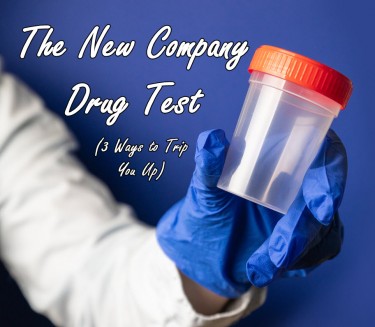
4 Industries to Avoid If You Fail a Surprise Drug Test
Which industries test their employees for drugs the most? Data based on a Feds report!
While a majority of Americans now support legalizing cannabis, drug testing in the workplace is still not up to date.
We’re living in the age of marijuana reform now, but the ramifications for positive job drug tests or zero-tolerance policies are just not feasible anymore. Traditional cannabis testing methods, which typically involve urine, oral fluid, or hair samples, do not tell employers whether employees have recently used cannabis, and therefore do not provide employers with the data they need to make equitable decisions about cannabis use meeting of employees.
The US Bureau of Labor Statistics (BLS), a federal agency, just released a report stating that drug testing in workplaces across the United States has already declined significantly in recent years, reports Marijuana Moment. This is timely as more states have ended cannabis prohibition so the information seems appropriate for the time. However, there are still numerous industries that screen their employees, and the report shares which do the most and which do the least.
Their report was released as part of a project to measure industry response to the COVID-19 pandemic. It is also the first time since 1996 that the BLS is surveying employers about their drug testing policies, although since then about three-quarters of US states have legalized the use of medical cannabis, while over a third have already approved recreational use of the drug. The good news is that drug testing is now less frequent in states that have legalized cannabis.
For the new report, the surveys were sent to about 317,000 workplaces across the United States, although just over 80,000 workplaces submitted responses that could be used in the results. But unlike their other surveys, employers were asked to provide answers to questions online and did not use an interviewer.
The data show that in 1996 about 30% of the workplaces surveyed were screened for drugs and 14% for alcohol use. With the new results, 16.1% of participating companies reported for drug and/or alcohol screening. It was interesting to note that the industries with the lowest rates of drug testing were lodging and food services, information, entertainment, education, and financial services. On the other hand, the transportation and warehousing industries, including the federally regulated trucking industry, have been tested far more than others.
Last year, Farah and Farah conducted a survey of 1,000 employees about their workplace drug testing policies. 60% of respondents said their employer’s attitude towards drug testing had not changed after cannabis legalization, although 21% said they were unsure if their employer’s drug use policy had changed after legalization.
Survey responses found that employers in most industries were drug tested before hiring, but in most industries, including government, retail and construction, it was normal for companies to conduct random drug testing. Finance and technology and other industries
Should companies stop drug testing for marijuana?
One cannot help but wonder if pre-employment drug testing or randomized and up-to-date workplace drug testing is still serving its purpose. After all, most states have already legalized cannabis, so it’s high time employers thought about the future of their valued employees, especially if they still have outdated drug testing regulations with unfair consequences.
The history of pre-employment drug testing dates back to the days of President Ronald Reagan, when the “War on Drugs” began. During that time, it was a government mandate that federal employees be tested for drugs, but it wasn’t long before the private sector followed suit. By 1987, the Drug-Free Workplace Act was signed into law by President Reagan, a law that required employers and businesses that received federal government assistance to adopt a strict zero-tolerance drug policy should they wish to continue to benefit from federal funds and Grants.
Within a few years, pre-employment drug testing became the norm, and studies funded by both the federal government and drug testing companies were published soon after, focusing primarily on the importance of drug testing for workplace safety. Back then, it was common for most people to believe that cannabis was harmful.
Fast forward to the present day and we can now see that these values are antiquated at best. The professional landscape is rapidly changing as more and more people rely on cannabis to function, improve their quality of life, and in fact many people perform even better when taking THC or CBD. Pre-employment drug testing has been banned outright in three states: New York City, Nevada and Philadelphia, but employers in other states can still test for cannabis.
They are not required to comply with government-established drug testing regulations, although some states have already enacted laws that include special considerations about safety-sensitive jobs, such as workplaces.
Last summer, retail giant Amazon announced that it would stop testing its employees for cannabis amid a shrinking job market as well as compliance issues with more states legalizing cannabis. Hopefully more private employers will follow, even if their industry isn’t addressing the labor shortage. This trend is essential to creating a fairer and fairer workplace, especially for those who rely on cannabis for their own health and well-being.
It is also said that there is no point in keeping the criminal element in the situation. Companies must end the practice and culture of not hiring an applicant simply because they test positive and, in the same light, firing someone or taking action if they test positive on a random drug test.
DRUG TESTING IN AMERICA, READ MORE..

WILL DRUG TESTING FINALLY DISAPPEAR IN AMERICA?
OR..

WHAT ARE THE NEW DRUG TESTING POLICIES IN AMERICA?

Post a comment: